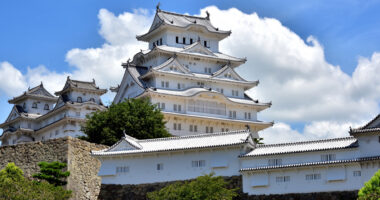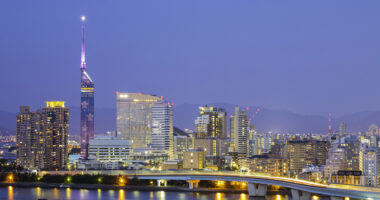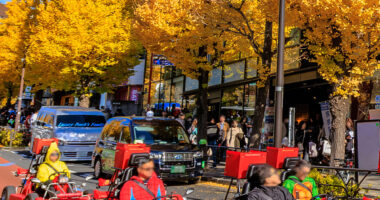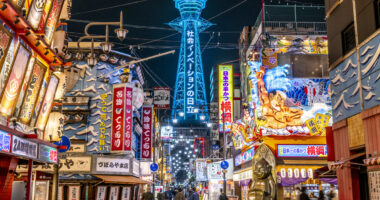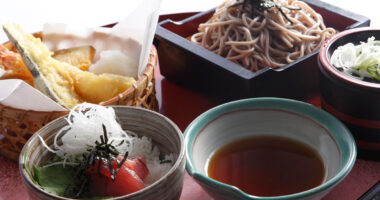Japan is a fascinating country with a unique culture and thriving business scene. When planning a business trip to Japan, it’s important to be well-prepared and understand the local customs and practices. In this comprehensive guide, we will cover essential information on comfortable stays, smooth communication, efficient work environments, transportation, emergency responses, and legal/regulatory matters to help you navigate your trip with ease.
Comfortable Stay
Business Hotels: When choosing a business hotel, prioritize location by selecting one near your meeting place for convenience. Consider facilities such as free Wi-Fi, meeting rooms, and in-room amenities like an iron and steamer. Many business hotels in Japan also offer rooms with a functional layout, which may include a work desk, TV, mini-fridge, and air conditioning. Additionally, some hotels provide a buffet-style breakfast with a mix of Japanese and Western dishes. It’s essential to read reviews and compare prices on various booking websites to find the best option for your needs.
You should note that Japanese business hotel rooms tend to be more compact than the average hotel room in many other countries, measuring between 100 and 150 square feet for standard rooms, and luxury rooms sometimes reaching 300 square feet. Finally, tall people may need to compromise. Japanese hotel beds are usually not longer than 195 centimeters (6’4″), with occasional ロングサイズ rongu saizu (long size) beds measuring 205 centimeters (6’7″). If the dimensions are not clear from the photos provided on the website and are not specified in writing, you can confirm by contacting the hotel directly.
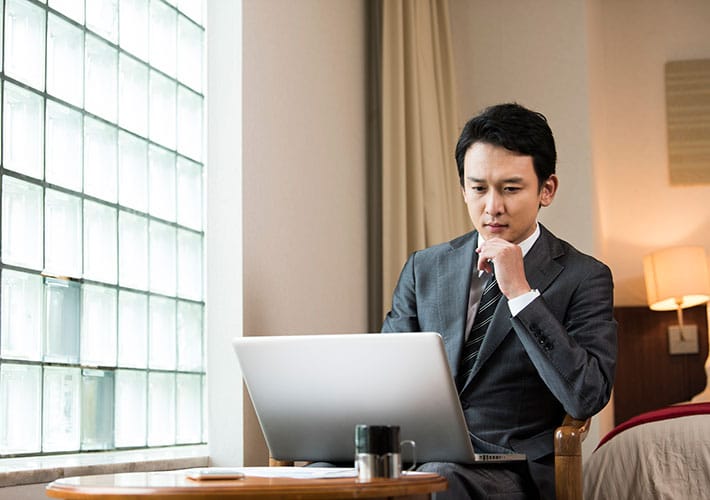
Getting some work done in a Japanese business hotel room.
Grooming: Maintaining a professional appearance is crucial during a business trip. Although many hotels provide irons and steamers, you can also use external cleaning, shoe polishing, hair salon, and beauty salon services if needed. You may find hair salons and beauty parlors in shopping centers and commercial districts. It’s a good idea to ask your hotel’s front desk for recommendations on reputable establishments nearby.
Relaxation: After a long day of meetings and work, it’s essential to unwind and recharge. Many hotels in Japan offer massage chairs in their relaxation areas, and some even provide massage services either on-site or through partnerships with nearby establishments. Alternatively, you can visit a local 温泉 onsen (hot spring) or 銭湯 sentō (public bath) to soak in a hot bath and relax your muscles.

Many hotels have massage chairs for your comfort, sometimes even in the room.
Smooth Communication
Items to have: Staying connected is crucial for business travelers. If your company hasn’t provided you with one, make sure to have a SIM card (specifically geared towards international tourists) sent to you or delivered to you when you arrive, and rent a mobile router. If you haven’t planned in advance, many airports in Japan have desks where providers offer these services as well. Although you’ll probably have one at your hotel, it’s also a good idea to familiarize yourself with local WiFi hotspots. For more information, refer to our detailed article on this topic here.
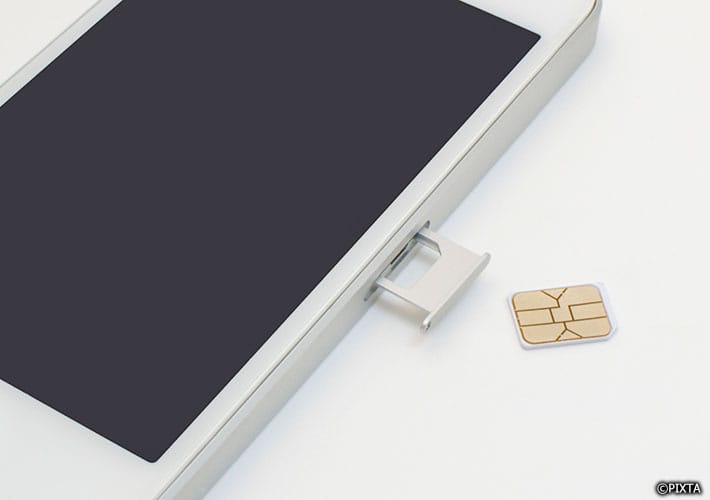
Having a SIM card could be crucial to stay connected during your stay.
Things to remember: To ensure smooth communication, familiarize yourself with Japanese business manners, such as exchanging business cards, participating in meetings, and dining etiquette. In Japan, business cards are exchanged with both hands and should be treated with respect. During meetings, it’s essential to be punctual, polite, and attentive. For dining, be aware of table manners like not pointing with chopsticks or pouring your drink.

Exchange cards with both hands if you’re following traditional manners in Japan.
Efficient Work Environment
Using rental offices and co-working spaces: Sometimes, you may need a quiet place to work or hold meetings outside your hotel. Rental offices and co-working spaces offer a productive work environment with facilities such as Wi-Fi, printing services, and meeting rooms. Major cities like Tokyo and Osaka have numerous options, including international chains like WeWork and local providers.
Faxes in Japan: Despite the prevalence of email, faxes are still widely used in Japan. It’s essential to learn how to send and receive them to ensure smooth communication. Many hotels and rental offices provide fax machines and convenience stores like 7-Eleven or Lawson offer fax services as well.
Working in cafes: Many cafes in Japan offer power outlets and Wi-Fi, making them suitable for remote work. However, keep in mind that some cafes may have restrictions on using power outlets during peak hours or require a purchase to access Wi-Fi. Be respectful of other customers and maintain a low noise level when working in a cafe.

If you feel too cramped in your hotel room, many cafes can provide a good working environment.
Basic Means of Transportation
Access from the airport to the city center: When arriving in Japan, you’ll need to know how to get from the airport to the city center. In Tokyo, for example, you have several options, including the Narita Express, Keisei Skyliner, airport limousine buses, and taxis. The Narita Express and Keisei Skyliner are both train services connecting Narita Airport to central Tokyo, while airport limousine buses serve various destinations throughout the city. Taxis are the most convenient but also the most expensive option. For more details, see our article here.
Using public transportation: Japan’s public transportation system is highly efficient and reliable, consisting of trains, subways, and buses. Familiarize yourself with the different lines and operators in the area where you’ll be staying. When using public transportation, you can buy single-use tickets or use rechargeable IC cards like Suica and Pasmo, which can be purchased at train stations. These cards make it easy to tap in and out of the system and can also be used for buses and even some convenience stores. For more details, see our article here.
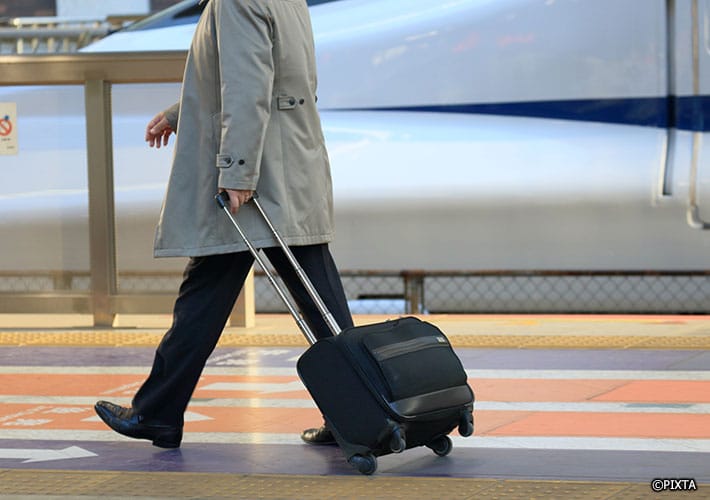
Taking a shinkansen in Japan.
Emergency Response
Dealing with illness or injury: In case of an emergency, dial 119 for an ambulance or the fire department, and 110 for the police. It’s essential to know the address of your location when calling for help. When choosing a hospital, it’s best to ask your hotel’s front desk for recommendations on nearby medical facilities that offer services in English or your preferred language.
Overcoming language barriers: While many Japanese people study English, not everyone is fluent, which may lead to communication challenges. To help overcome language barriers, consider using translation apps like Google Translate or, if you’re independently employed and your company isn’t providing one, hiring an interpreter through services like Gengo or ProZ.
Legal and Regulatory Matters to Keep in Mind
Carrying passports: As a foreigner in Japan, you are required by law to carry your passport with you (not in the hotel room) at all times. You can potentially be arrested if you don’t. Make sure you have a physical copy with you and store a digital copy on your phone or another secure location in case of loss or theft.
Smoking regulations: Japan has strict smoking regulations, with many public places designated as smoke-free zones. Use designated smoking areas when necessary and be mindful of those around you. For more information, see our article here.
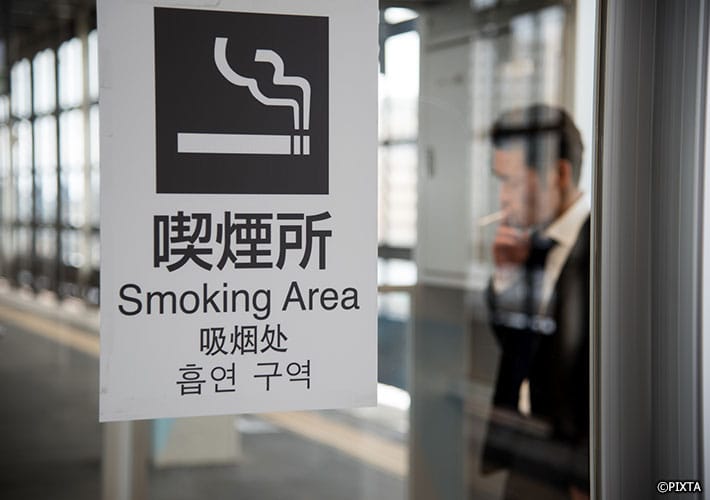
Be sure to use designated smoking areas in Japan.
Drunk driving: Japan enforces strict drunk driving regulations and has a zero-tolerance policy. If you plan to drink alcohol, use public transportation or taxis to get around instead of driving.
Drug-related laws: Japan has strict regulations on importing and using medicines and drugs. Some prescription and over-the-counter medicines available in other countries may be illegal in Japan. If you need to bring prescription medication, make sure you have proper documentation and check Japan’s regulations on importing such medications. For more information, see our article here.
In conclusion, being well-prepared and knowledgeable about Japanese customs, practices, and regulations will make your business trip to Japan more enjoyable and successful. By considering the topics covered in this guide, you’ll be able to navigate your trip with ease and confidence, ensuring a productive and memorable experience in this unique and captivating country.



